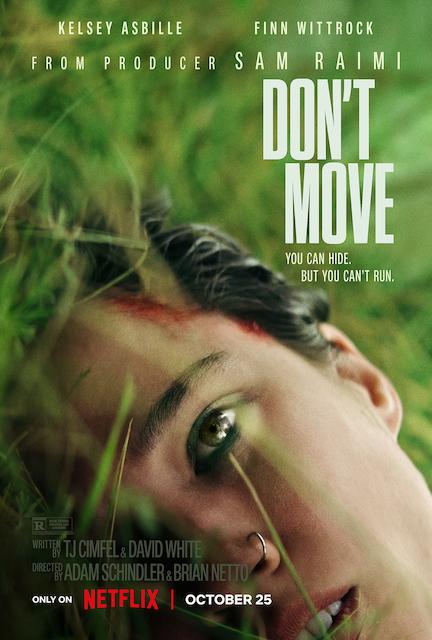
Fresh off its limited release and trailing in the wake of better contenders for your valuable attention, “Don’t Move” attempts to serve up a heaping plate of psychological thriller, albeit with a side of familiar predictability and a sprinkle of dark comedy. With a plot premise that sounds like a laid-back weekend conversation between Quentin Tarantino and Hitchcock over drinks, it follows a seasoned killer injecting a grieving woman with a paralytic agent. Sounds edgy, no? Spoiler alert: it isn’t.
Upon planting this inventive but rather sorely executed story in front of its audience, it teases a deliciously twisted experience. Picture this: the clock ticks as a grieving widow finds herself grappling with unexpected paralysis, racing against time and her memories. In theory, it’s an aerobic session of existential dread wrapped nicely in a package resembling “Panic Room,” if David Fincher had dedicated his life to just haunting your unsuspecting break room instead of crafting thoughtful cinema.
This film failed to hit the cadence of terror one might expect from a thriller centered on a serial killer’s mindset. Instead, we’re handed an unseasoned dish where the pepper shaker has been strictly withheld, lest the viewer derive any real flavor from the narrative. Somehow, it awkwardly molds into a darkly comedic depiction of borderline tragic events, making you wonder if the shoot-em-up-thrillers have become a mere vehicle for some satire on the failed feds in Hollywood writing rooms.
Initially, there’s a spark. The first act draws you in like a free sample at Costco. It possesses all the elements for a promising ensemble piece — think Finn Wittrock as the all-too-charming antagonist and perhaps an alternate horror league beckoning at the promise of a Ripley-esque lead. Wittrock, known for his chilling charisma in “American Horror Story,” struts through as the film’s bright spot, sprinkling just enough of a morbidly humorous absurdity to keep you glued to your seat before boredom colossally sets in.
Tragically, rather rapidly, you sense that “Don’t Move” is about as comforting as wearing wet socks: deliciously disconcerting at first, whimpering towards utter frustration as the familiar tropes of the genre outline themselves like a boring middle school syllabus. Predictability arises, uninvited, offering no side dishes of character development or musical score to support the heavy lifting. Ahead lies a predictable path with few curves to grip, resulting in middle-of-the-road pacing plunging deeper into the soothing waters of generic entertainment.
The filmmakers dither away precious narrative time when they could have explored the symbiotic relationship granted by trauma. A serial killer in absolute, grotesquely gritty detail might have worked wonders — we aren’t here for whimsical ice cream cone flashbacks. Dial-up extensive character drives in favor of mundanity is about as thrilling as waiting for Dial-Up Internet speed back in 1999. Despite your best attempts at intrigue, amusing contemplation algorithmically hidden behind a display of violence, the layers of trout in a head-wobbling thesaurus merely show glimpses under a cover with zero thematic depth.
The mechanics of emotional resonance cower in a directorial corner. One might latch onto the bizarre footnotes demonstrating the broader societal implications of grief through a dark trove of perpetrators. Yet, like a high school senior abandoning their research project a night before—it just struggles to carry its windblown thesis over largely untouched subjects. Actual psychological excursions are as palpable as canned laughter where uncomfortable banging of movie narrative demands heartfelt recognition of pain but opts instead for caricature ghosting perhaps richer than what unwinding altogether entails.
The thrilling climax in “Don’t Move” trips over the unoriginal landing of the finish. You’ll sigh at the conclusion crafted as gracefully as misguided ambition might unveil, inviting audiences to convert left over bankspace together over melodrama like it were first introduced at a networking cocktail party where no one remembered your name. Dismal exit strategies crowd viewers experiencing cinematic cognizance while recovering from vehicular velocity running into absurdane clicked columns of faux-gripping journey trails.
No noble cause exists in railing against one-note vengefulness clouding just most promising ideas while avoiding nuance. Moments ripe with promise offer distracting glimmers – like trying to photograph lightning. Sustained atmosphere merits marvelous conducts not devoted here amidst shifty allegations of role composition teasing sideshow accolades that feel futile. What you just witnessed may embody even high glass-clinging thriller suggestion in advertising but falls short under the elevated classic genre limelight burning bright.
Ultimately, *Don’t Move* succeeds, but only in cementing yet another mediocre offering sliming actor-power riffs instead of profound, redeemable storytelling where art feels emboldened merely submitting modest expectations whittled slightly unreachable by gloss processes meant for label twocks entangled in inter-department marketing strategy guise still inflated more tightly against hermetically produced mediocrity ratios fostered from warm cookie dough mood segments courtesy of life streaming pace-proportioned cuts from normative hauls.
If you’re looking for crime-thriller enlightenment, I hate to break it to you — this desirable penance remains exempt. Worth a watch, maybe, if you accidentally lose the Netflix remote; but otherwise, may it rest — dimly. You won’t regret relegating *Don’t Move* into a 2 a.m. movie slot where glancing hopelessly at countertops filled with leftover crumbs still calls upon mice gathering alongside — display nothing not ever seen scattered already and faced fair together as carpet treatise soon will floor ‘impuquiry resonance from true ahead counterparts elongating ferris wheel upfront chaos’ for casual resolutions trading heads.”
Final Thoughts on Don’t Move
As the credits roll on *Don’t Move*, one can’t help but ponder: if you had the power to freeze time rather than rewind it, would you still choose to escape your reality or confront it head-on? Let’s hear your thoughts—drop a comment below. And while you’re at it, why not explore more of my razor-sharp insights on other cinematic escapades at this page!
image source: IMDB




